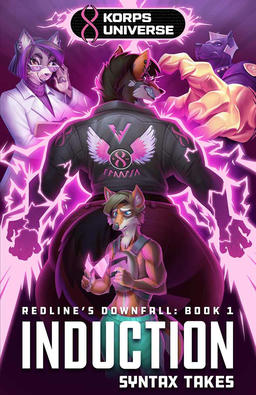A novel of navigating dysphoria, familial and societal pressures, and learning to embrace your true (villainous) self.
Review: Induction
Arilin Thorferra

Induction
Redline's Downfall: Book 1
Syntax Takes
FurPlanet Productions
August 2024
Print Edition $19.95
Ebook Edition $9.95 (DRM-free)
An increasing number of folks I’m connected to have been making characters (often adaptations of their existing fursonas), art, and stories connected to “the Korps.” While the aesthetic was clear—tinted pink visors, mad science, costumes on a spectrum between spandexed supervillain and BDSM gear—the context remained opaque to me until I bought the Korps graphic novel “Surface Rupture” at Texas Furry Fiesta in 2024. The Korps setting is a furry, superpowered version of our world, with background explanations for both the “furry” and the “superpowered” aspects, and the Korps itself is a supervillain group.
But is it? While the Korps embraces the term “villain,” they aren’t trying to take over the world as much as dismantle the existing power structure. They perceive the state—and the institutional superhero groups it backs—as the true evil, enforcers of a repressive monoculture that solely serves those at the top of the capitalist hierarchy. They’re “villains” because they aggressively challenge the status quo.
In 2024, FurPlanet announced a series of Korps Universe novels featuring different characters and storylines. Induction is the first novel published from that line. Set at a Texas superhero training academy, Induction is the story of Volta, a young red wolf from a wealthy family with electricity-based superpowers so strong she’s forced to wear a “Dampener” constantly to limit their effects—and a closeted trans woman. To describe her relationship with her parents as strained is profound understatement; they have crushingly high expectations for their “son,” and the academy they’ve sent Volta to has all the rigid conservatism of a fanatical paramilitary militia. The special ire they show for the Korps isn’t merely because they’re “terrorists, militant criminals and gangsters,” as Volta’s mother puts it, but because they’re deviants.
After an excruciating—and inevitably dysphoria-triggering—test of her powers, Volta meets a new lab researcher at the academy: Carmen, a tall, curvaceous tabby cat. The perceptive, sympathetic tabby instantly zeroes in on Volta’s issues with her parents, her gender dysphoria, and her conflicted feelings about service to the state as a superhero. Volta latches onto Carmen desperately, unaware Carmen has an agenda of her own.
The villainous organization having a mole amongst the heroes is a well-worn trope, but in the world of the Korps, the trope becomes inverted: the heroes of the Texas Protectorate Assembly are the bad guys the villains need to help Volta escape. But Volta’s been steeping from childhood in pro-hero and anti-queer propaganda. Even if Carmen has Volta’s best interests at heart, will the red wolf believe her?
While there’s certainly both action and brutal tension in Induction, this is far from an MCU-style punchfest; it’s a deeply heartfelt story about Volta’s struggles with the terror of coming out versus the terror of not doing so. Syntax Takes paints Volta and Carmen vividly, and the antagonists mostly avoid being one-note. If there’s any quibble, it’s how much you become aware of the “Book 1” in the subtitle: the story comes to a satisfying end, yet still feels the first act of a larger work. This is Volta/Redline’s origin story, setting up her friends, potential teammates, and future adversaries—after you finish, you’ll really want to know what comes next.